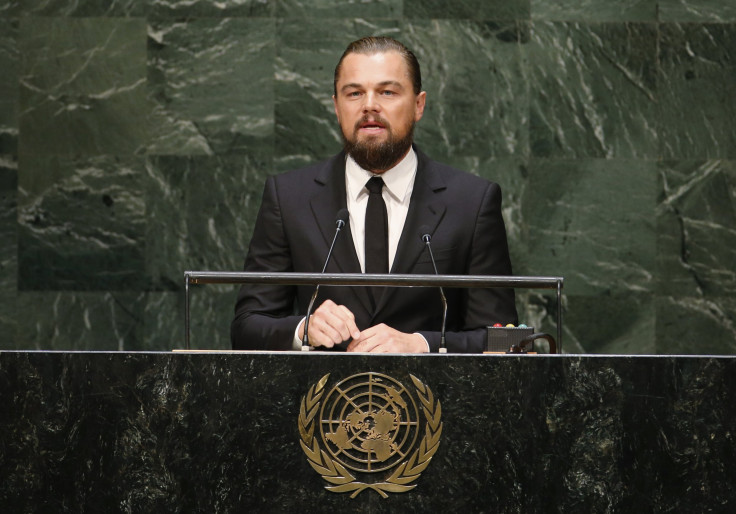UN Climate Change Summit: Leonardo DiCaprio Says Global Leaders Have Moral Duty To Confront Climate Challenge

Actor Leonardo DiCaprio urged world leaders Tuesday to confront the challenge of global climate change. At the opening session of the United Nations climate summit, he told presidents and prime ministers, “You can make history … or be vilified by it.”
“This is not a partisan debate; it is a human one,” he added. “Clean air and water, and a livable climate are inalienable human rights. And solving this crisis is not a question of politics. It is our moral obligation -- if, admittedly a daunting one.”
DiCaprio was named the U.N.’s representative on climate change last week and tapped to open the New York summit, which is being held on the sidelines of the U.N. General Assembly’s annual ministerial meeting. U.N. Secretary-General Ban Ki-moon called the special summit, which has drawn over 125 heads of state, to accelerate global efforts to curb greenhouse gas emissions ahead of formal climate talks in Paris in 2015.
The actor and U.N. chief -- along with former U.S. Vice President Al Gore -- marched together on Sunday in a massive climate change demonstration across Manhattan’s west side.
In his Tuesday remarks, DiCaprio highlighted the effects of global warming that are already being felt, and which scientists say will intensify over time: Severe and enduring droughts; warmer and acidifying oceans; a hotter atmosphere; extreme weather events; and unprecedented melting of the West Antarctic and Greenland ice sheets.
“Every week, we’re seeing new and undeniable climate events, evidence that accelerated climate change is here now,” he said. “Humankind’s greatest challenge is now.”
The 39-year-old actor urged leaders to adopt sweeping policies to reduce emissions, including adopting a price on carbon dioxide, which would make it costlier to extract and burn oil, coal and natural gas. He called for cutting subsidies to fossil fuel companies and incentivizing low- and zero-carbon renewable energy sources.
“This is not about just telling people to change their light bulbs or to buy a hybrid car. This disaster has grown beyond the choices that individuals make. This is now about our industries, and governments around the world taking decisive, large-scale action,” DiCaprio added.
Ban Ki-moon and a coalition of governments and over 1,000 companies have similarly called for putting a price on carbon. Proponents say that country negotiators should adopt a universal carbon plan that can be incorporated into a broader global agreement in Paris.
Gore, a leading climate activist, also spoke at the opening session. He said that Sunday’s march -- which had an estimated 400,000 participants in New York -- “made clear we are entering a period of hope.”
He hinted at the growing frustration among the general public that the two decades-long U.N. climate process has so far failed to produce any discernable impact on global emissions. The 1997 Kyoto Protocol expired two years ago with limited results, and attempts to negotiate a successor treaty resoundingly failed at a 2009 conference in Copenhagen.
“The path to change is clear. It leads to a global agreement next year in Paris. To those who have grown cynical about the process, I would remind you of the words of the great [American] poet Wallace Stevens: After the final no, comes a yes,” Gore said. “All we need is political will.”
© Copyright IBTimes 2025. All rights reserved.





















